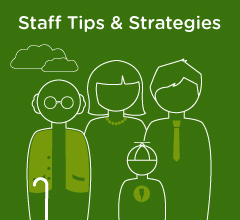Tips for Those Caring for Someone with Hoarding Behaviors

Author:
Do you know or care about someone who collects items excessively to the point that a space is no longer able to be used for its intended purpose? Are you concerned about the person’s safety and about your relationship? You are not alone.
What is Hoarding? Hoarding is a mental illness exhibited through excessive acquiring and failure to discard large numbers of possessions that may appear useless or of limited value to an onlooker. The result is overrun living spaces that may make even beds and sinks unusable. Similar to an addiction, hoarding behaviors can be managed, but not cured.
Impacts of Hoarding: People who hoard are often fine with their possessions. The thought of purging belongings at the request of those expressing concern often creates emotional turmoil for all concerned. Hoarders also fear having others discover their hoarding habits. They may not be able to acknowledge the impact or risk and often won’t be pressured to change. Still, keeping the hoarding a secret is emotionally draining. Isolation often results. Relationships between those that hoard and those who care for them can be very complicated. People that hoard tend to distrust anyone who wants to remove or manage their belongings without their consent. Often too much of a relationship may focus on the hoarding problem rather than on what really matters – the personal connection between individuals.
The following tips can help cope with the emotional roller coaster of caring for someone that hoards:
- Concentrate on quality time together. Find enjoyable activities completely unrelated to the hoarding – going for walks, cooking a favorite recipe, or attending a performance, for example.
- Differentiate between your feelings and your loved one’s feelings. You may be the one who longs to purge excess objects. But real change can only occur if the desire comes from the person who hoards.
- Leave cleanup to professional organizers. If an adversarial or unresolvable situation arises, it happens outside the family.
- Keep a journal of your feelings. This will relieve stress, help you let go of negative feelings and acknowledge how hoarding interferes with your life.
JSSA is working with the City of Gaithersburg Hoarding Task Force to offer a Family Member Hoarding Support Group.
